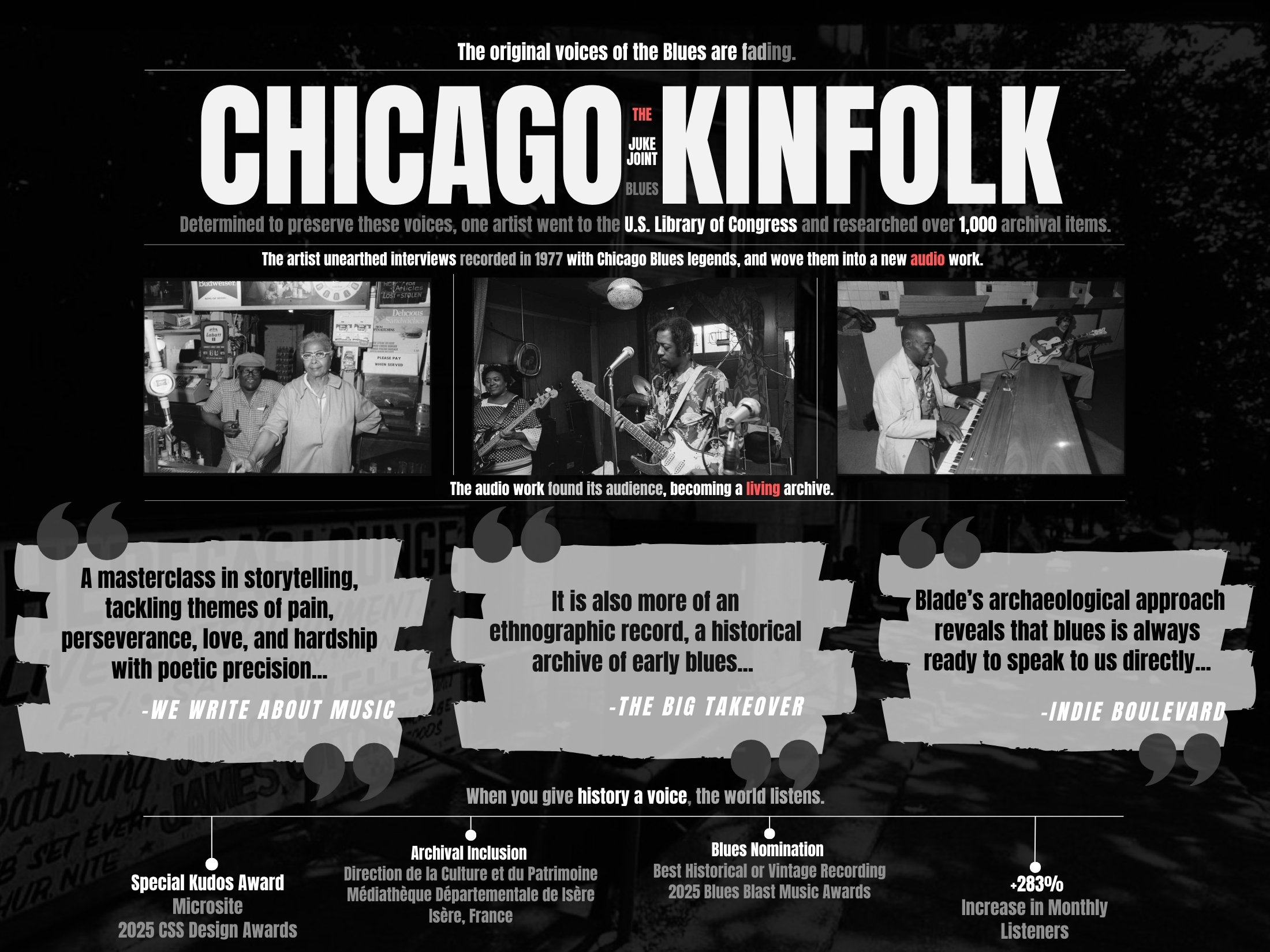
The driving idea behind "Chicago Kinfolk: The Juke Joint Blues" is to redefine the blues genre by creating a dynamic, living archive that bridges its historical roots with contemporary societal narratives. The project's core ambition is to rebrand the blues for a modern ear while simultaneously paying a profound homage to the Juke Joint era that first brought the blues sound to a wider audience. This groundbreaking 10-track album, released February 28, 2025, serves as an ethnographic exploration and profound cultural document. The album transcends the conventional album format, presenting itself as a study, an artistic statement, an archival deep dive, and even—a dialogue.
Terry Blade innovatively interweaves original compositions and blues covers with authentic 1977 interview recordings of Chicago blues legends. This documentary approach transforms historical audio into a vibrant, immersive musical experience, making previously hidden gems accessible to a contemporary audience.
The project aims to achieve multi-faceted goals: meticulously preserving Black American cultural heritage and ensuring the blues' legacy continues to resonate and educate new generations. Simultaneously, it powerfully addresses pressing contemporary social issues, including American injustice and Chicago gun violence, using the blues as a poignant lens for societal reflection. By fostering genuine curiosity and emotional connection, "Chicago Kinfolk: The Juke Joint Blues" makes history tangible and relevant, inspiring meaningful progress through art.
The strategic foundation of "Chicago Kinfolk: The Juke Joint Blues" was built upon Blade's meticulous research and curation of public domain archival recordings. These invaluable audio materials, sourced from the Chicago Ethnic Arts Project Collection of the American Folklife Center at the U.S. Library of Congress, were largely hidden gems before this project. Blade's initiative has brought these overlooked historical voices to a significantly wider audience, transforming static archives into a vibrant, accessible cultural experience. This proactive engagement with neglected historical resources demonstrates a resourceful approach to cultural stewardship.
The album's creative execution is marked by its deliberate stripped-back production, fostering a "brilliantly intimate listen" that authentically captures the "grit, sweat, and soul of the juke joint era". The innovative structure is further underscored by the seamless integration of spoken word, with intertwined audio scenes during and in-between songs, creating an experience akin to listening to a documentary. This approach results in a cohesive whole where contemporary songs are interwoven with interview fragments from blues pioneers like Theresa Needham, James "Muddy Waters Jr." Williams, Jimmy Walker, Lefty Dizz, and Willie Monroe. This unique blend ensures the historical content is not merely informative but deeply felt, enhancing its impact and memorability.
Blade's artistry is central to this success. His vocals are described as both "nuanced and powerful," possessing a "rich and resonant" quality that carries the "weight of years of passion for the blues". He masterfully strikes a perfect balance between honoring tradition and asserting his own voice, bringing a soulful, modern touch that effectively grounds the historical narratives in the present. Tracks like Nothin' But the Blues (feat. Theresa Needham) set the tone with authentic interview excerpts, while Fallen Sons offers a poignant commentary on gun violence in Chicago, using metaphors of Black American cowboys.
The album's dissemination strategy centered on a wide digital release, making it available everywhere on major platforms including Spotify, Bandcamp, and YouTube. Blade's established reputation as an award-winning singer-songwriter, with accolades such as the Blues Category Winner of the 2023 American Songwriter Song Contest and multiple Telly Awards, significantly bolstered the project's credibility and potential for broader impact. This strategic choice to leverage both deep historical research and a recognized artistic platform ensured the album's cultural significance reached a diverse and engaged audience.
"Chicago Kinfolk: The Juke Joint Blues" has achieved significant cultural and audience impact, successfully meeting its objectives of cultural preservation, education, and social commentary. The Direction de la Culture et du Patrimoine, Médiathèque Départementale de Isère in Isere, France, has included the album in its digital collection. Qualitative feedback underscores the album's success in fostering emotional connection and educational impact, with reviewers calling it "more of an ethnographic record, a historical archive of early blues than just another album," a "musical and cultural journey, where each track tells a story and each break between songs is filled with precious testimonies," a "historical preservation effort, and a socially conscious work of art," and a "an educational experience, rooted in the voices of those who shaped Chicago’s Blues scene." The album received strong ratings, including a 4.2/5 from The Indie Grid, 4.5/5 from Country Universe, and a 8/10 from Alt77. On July 7, 2025, the album was nominated at the Blues Blast Music Awards in the Historical or Vintage Recording category.
Quantitatively, the album demonstrates strong digital engagement. Blade's Spotify Monthly Listeners saw significant growth spikes, increasing by 123.3% and 283.1% following its release, indicating a growing and engaged audience. Its broad availability across major platforms ensures accessibility. Blade's goal to create a living archive and ethnographic exploration was achieved through the album's innovative integration of authentic 1977 interviews with original music, transforming historical audio into an immersive, educational experience that critics call a "masterclass in storytelling" and a "modern-day blues masterpiece."









